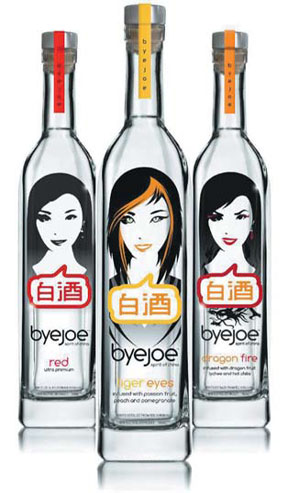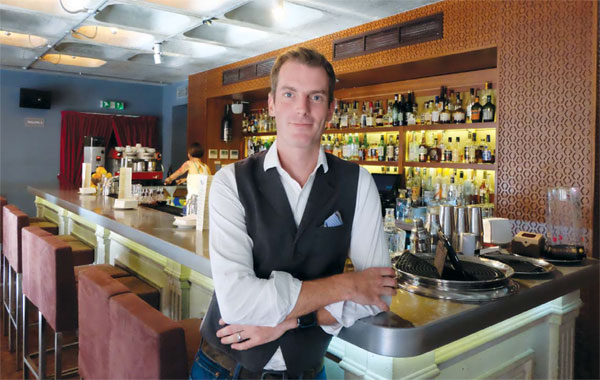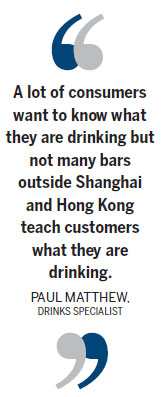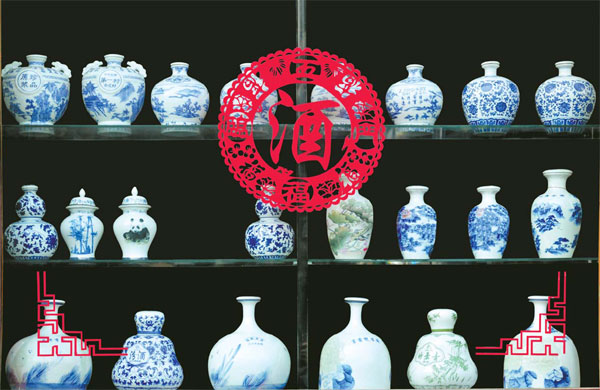Baijiu tasting part of fun at London bar
By Cecily Liu in London (China Daily Europe) Updated: 2015-07-24 08:11Former beijing resident serves fiery Chinese spirit in western cocktails, giving guests new experience
Paul Mathew still remembers vividly the first time he tasted baijiu, the fiery white Chinese spirit - He was on a business trip to Yunnan in 2004. "Pungent" is the word he uses to describe the drink, and needless to say he did not appreciate it very much.
But today he's become one of London's very few baijiu experts, and his bar, The Hide, will be hosting a day of creative baijiu-tasting and cocktail-making on Aug 8, which has been dubbed World Baijiu Day.
Baijiu, a traditional Chinese drink typically containing 40 to 60 percent alcohol by volume, is usually distilled from fermented sorghum, and has been made for about 5,000 years in China. Despite being very little known beyond China's borders, it is the world's most consumed alcohol.
Although China's younger generation are shunning it in favor of western drinks such as champagne, whiskey and wine, internationally baijiu is growing in popularity amongst businesspeople who are becoming familiar with Chinese business dinner table etiquette.
|
Paul Matthew says he wants to give guests an interesting and educational experience while enjoying themselves at his bar, The Hide. Cecily Liu / China Daily |
Mathew's experience is a good example, as he was working for a conservation charity at the time, and had to drink with a group of Chinese forestry officials. "I was drinking in the 'ganbei' way, drinking hard and drinking lots. The baijiu we had was a local brand, we were not told anything about it, and had to drink in quantity," he says.
But in 2009, Mathew moved to Beijing with his family and lived there for four years. During this time, he became acquainted with baijiu's production process and started to appreciate the subtle flavors in the different types of baijiu.
"On one end of the scale, there is Redstar, which has a light fragrance and is easy to start mixing drinks with, and accessible to a Western palate. Then there are drinks like Shuijingfang, which has a full bodied profile. At the strong end, there is Wuliangye, which is the most pungent I've ever done anything with; I like to taste it, but I need to prepare myself for it," he says.
Mathew made the move to Beijing to accompany his wife, a diplomat who served a term in China, and he loved the experience. During the family's time there, Mathew would drop off his daughter at school every day, and spend lots of time exploring Beijing. He also did some consulting work for bars and drinks brands, and wrote articles for a drinks magazine.
In addition, he also enjoyed running in Beijing's parks, learning Mandarin, tasting Chinese food, and traveling across China to see and experience the vast variety of landscape and cultures the country has to offer.
One major drinks company he did consulting work for was Diageo, which had a partnership with the baijiu brand Shuijingfang. As a result of the connection, Mathew started to explore the possibility of mixing Shuijingfang into classic Western cocktails, such as the drink blood and sand, where baijiu acts as a substitute for Scotch whisky.
He then helped several bars to put this on their menu, so that expats and tourists could try their familiar drinks being prepared in an innovative local way. "It was a love-hate thing, some thought they're brilliant and interesting, others didn't like the flavor," he says.
After returning from Beijing, Mathew brought back his knowledge of baijiu to The Hide, a bar he opened nine years ago near London Bridge, in the heart of London. The bar serves two baijiu brands, Wen Jun and Shuijingfang.
The bar is conveniently located next to the Wine & Spirit Education Trust, a drinks education provider, and very often students who hear about baijiu pass by the bar to try it.
Although many Londoners still don't know about baijiu, the bartenders at The Hide introduce the history and production processes to customers and allow them to try it, and during the World Baijiu Day his staff will be serving a range of innovative cocktails with the spirit.
|
A showcase of bottles of baijiu made in Shanxi province, known for its famous liquor brand Fenjiu, in an exhibition room in the ancient town of Pingyao. Photos Provided to China Daily |
The World Baijiu Day is being launched by Jim Boyce, who has run the nightlife blog Beijing Boyce and the wine blog Grape Wall of China for nearly a decade, and has written about China's wine industry for both trade and mainstream publications. It is a day in which innovative bars like The Hide, all over the world, do something creative with baijiu so it becomes better known internationally.
Mathew's career path to become a drinks specialist was not a conventional one. Educated as a conservation scientist, he started bartending during his university years to support his studies.
Upon graduation, he started working for conservation charities, and work took him all over the world and exposed him to local drinks of the countries he traveled in.
In the UK the drinks industry was undergoing a renaissance in which new cocktail bars rapidly opened and popular cocktail recipes of the last century came back into popularity.
"This happened in the US and UK alike. People rediscovered recipes produced in the heyday of the last century, and rediscovered old brands that we've not used for many years, especially brands that had heritage and had craft behind them.
"Bartending also started to be treated as a profession, and bartenders started to learn more about the craft of the drinks, to be more artisan, and to learn about the classic drinks, taking more care with mixing of the ice, spices and herbs," he says.
Witnessing these rapid changes, Mathew made a brave decision. He sold his flat and opened The Hide nine years ago, and never had to look back. Over the years The Hide became a popular bar, and earlier this year he opened two new bars, The Arbitrager and Demon, Wise & Partners. 
He wanted to make The Hide a friendly bar where customers can casually visit and taste something different, perhaps discovering a new favorite in the process. "We wanted to give guests an experience uniquely tailored to them, allowing them to enjoy themselves, not just drinking but having a good time," he says.
Within this context, Mathew says that he likes baijiu because it adds to the variety of what is on offer. For him personally, drinking baijiu reminds him of the good time he had in Beijing with his friends and family.
As he enjoyed living in China so much, he says one of his dreams is to open a bar in Beijing, with a culture similar to The Hide, allowing a Beijing audience to taste and experience the best of the world's drinks.
"I think Chinese consumers are becoming more and more aware of different drinks being available. A lot of consumers want to know what they are drinking but not many bars outside Shanghai and Hong Kong teach customers what they are drinking," he says.
Although Beijing's customers and bars lag behind Shanghai and Hong Kong, Mathew has felt a sense of hunger for knowledge, as if the city is now becoming more international. "A lot of small bars have appeared but they don't have the budget to allow bartenders to learn about the more obscure things, and that's where I want to make a difference," he says.
cecily.liu@chinadaily.com.cn
(China Daily European Weekly 07/24/2015 page24)







